RESISTANCE CINEMA
Presents
“ENEMY ALIEN”
A project of Life Or Liberty Productions,
Produced and Directed by KONRAD ADERER (2011, 82 minutes)
WHEN: Sunday August 18, 2013 1:15 pm
WHERE: Community Church NY, Gallery Room 28 East 35th St. btwn Park & Madison Aves.
ADMISSION: Free, donations appreciated
SPECIAL GUEST: Filmmaker KONRAD ADERER
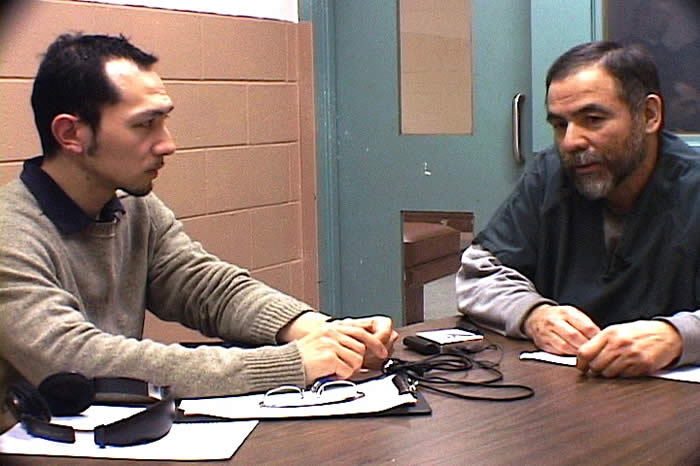 RESISTANCE CINEMA concludes its summer season with an intriguing film by a local NYC based filmmaker. Enemy Alien begins with the quest of a Japanese American filmmaker, Konrad, to document the underside of the patriotic fervor comparing the attacks of September 11, 2001 and Pearl Harbor: the post-9/11 detentions of Muslims and internment of Japanese Americans. Finding these aftermaths to be not only historically resonant but linked by immigration policy, he soon finds his own life transformed by this theme as he becomes involved in the fight to free immigration detainee Farouk Abdel-Muhti.
RESISTANCE CINEMA concludes its summer season with an intriguing film by a local NYC based filmmaker. Enemy Alien begins with the quest of a Japanese American filmmaker, Konrad, to document the underside of the patriotic fervor comparing the attacks of September 11, 2001 and Pearl Harbor: the post-9/11 detentions of Muslims and internment of Japanese Americans. Finding these aftermaths to be not only historically resonant but linked by immigration policy, he soon finds his own life transformed by this theme as he becomes involved in the fight to free immigration detainee Farouk Abdel-Muhti.
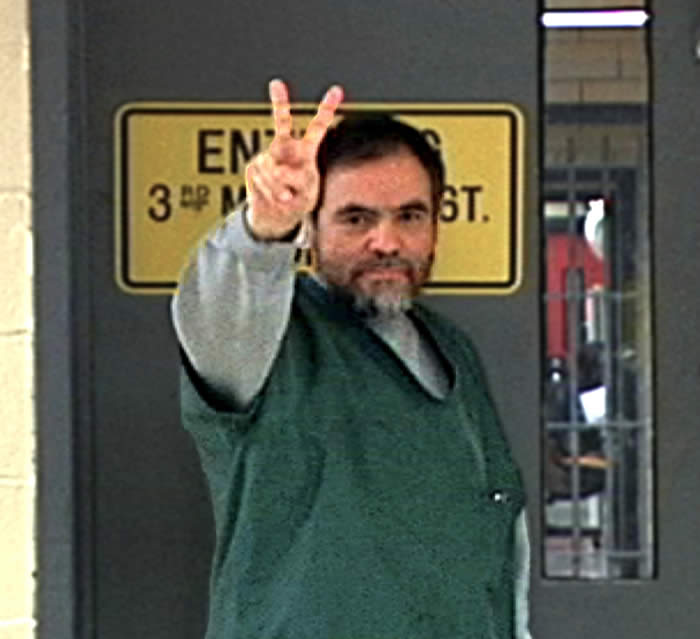
Like thousands of other detainees taken from Muslim immigrant communities, Farouk is not charged with any crime, but the government goes to great lengths to link him with terrorism. A Spanish-speaking Palestinian who arrived in New York City in the early 1970s, Farouk has become well known as a human rights advocate adept at building bridges between diverse communities. The activists who rise to his defense see a repressive political agenda behind the arrest of a Palestinian unafraid to speak out in the wake of 9/11.
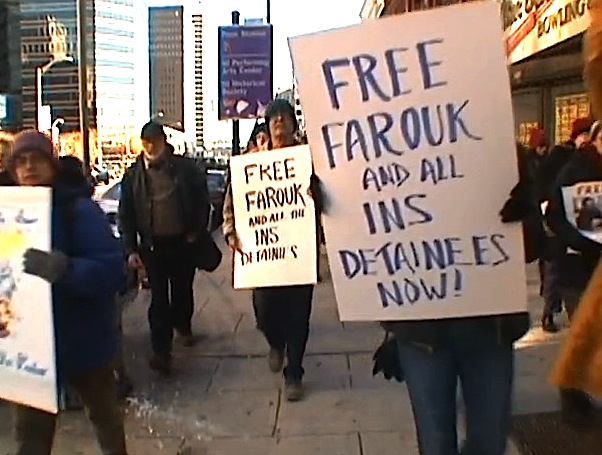 Even in his institutional green uniform, in a cramped prison visiting room, Farouk gives off a gentle but indomitable charisma. No self-pity or fear is evident in his lively retelling of his arrest, interrogation and beating by the federal agents who tried to coerce him into naming other Palestinian activists. Farouk’s idealistic vigor in these dire conditions makes a deep impression. Unprompted, he invokes the internment of Japanese Americans as a parallel for post-9/11 detentions, all but shaming Konrad into confronting his own family history.
Even in his institutional green uniform, in a cramped prison visiting room, Farouk gives off a gentle but indomitable charisma. No self-pity or fear is evident in his lively retelling of his arrest, interrogation and beating by the federal agents who tried to coerce him into naming other Palestinian activists. Farouk’s idealistic vigor in these dire conditions makes a deep impression. Unprompted, he invokes the internment of Japanese Americans as a parallel for post-9/11 detentions, all but shaming Konrad into confronting his own family history.
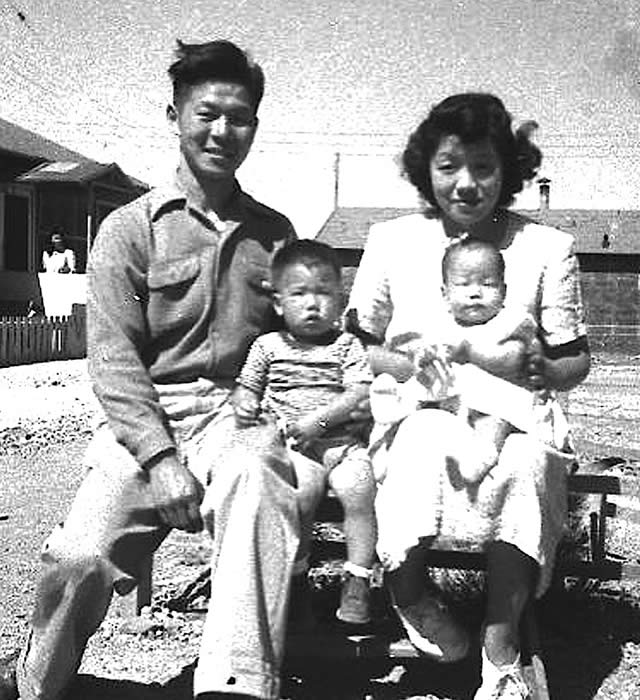
Asking his grandmother about her World War II internment for the first time, Konrad begins to claim his generational legacy: the betrayal and helplessness of the “enemy alien.” What truly inspires him, however, is the political consciousness emerging in the acts of resistance, large and small,  by the incarcerated Japanese: the refusal of many to submit to the “loyalty questionnaire,” and his own grandfather’s defiance of the ban on photography, illuminating a personal history the government tried to make invisible.
by the incarcerated Japanese: the refusal of many to submit to the “loyalty questionnaire,” and his own grandfather’s defiance of the ban on photography, illuminating a personal history the government tried to make invisible.
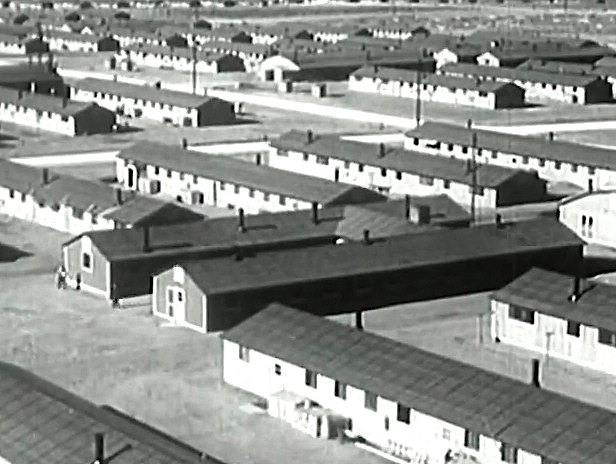
In a landmark legal case, the Center for Constitutional rights takes on the fundamental injustice of Farouk’s detention. He is held solely on the basis of a deportation order, but as a stateless Palestinian, he is undeportable. The clash of state and citizen is ultimately resolved in a jubilant victory, followed by searing but ennobling tragedy.
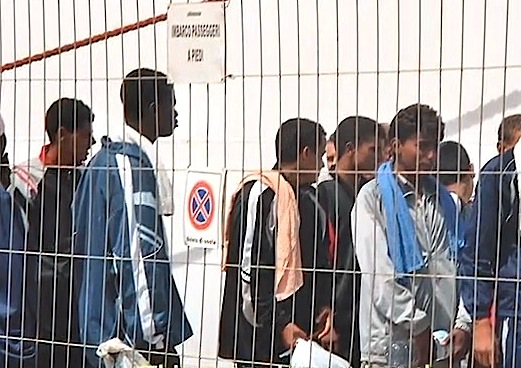 He is released on April 12, 2004 after 718 days in prison, 250 in solitary confinement. Tragically, on July 21, 2004, just as he was finishing a presentation at the Philadelphia Ethical Society, he collapsed and lost consciousness. He was rushed to the hospital but hours later was pronounced dead. He had been suffering from high blood pressure and a thyroid condition but the official cause of death was a heart attack. Eerily, his collapse was caught on film and appears in ENEMY ALIEN.
He is released on April 12, 2004 after 718 days in prison, 250 in solitary confinement. Tragically, on July 21, 2004, just as he was finishing a presentation at the Philadelphia Ethical Society, he collapsed and lost consciousness. He was rushed to the hospital but hours later was pronounced dead. He had been suffering from high blood pressure and a thyroid condition but the official cause of death was a heart attack. Eerily, his collapse was caught on film and appears in ENEMY ALIEN.

KONRAD ADRERER lives and works in his native New York City as a field producer, videojournalist and editor for NGOs, local TV and nonprofits including the United Nations and the ACLU. Since he established Life or Liberty (lifeorliberty.org), a nonprofit multimedia project, in 2002, much of Konrad Aderer’s work as an independent documentary producer has focused on immigrant communities coping with deportation and detention. Konrad’s work has garnered numerous grants including a James Yee Fellowship from the Center for Asian American Media, and an Individual Artist Grant from New York State Council of the Arts. He holds a BFA in Drama from New York University’s Tisch School of the Arts, and is completing a Masters degree in Sociology at Brooklyn College.